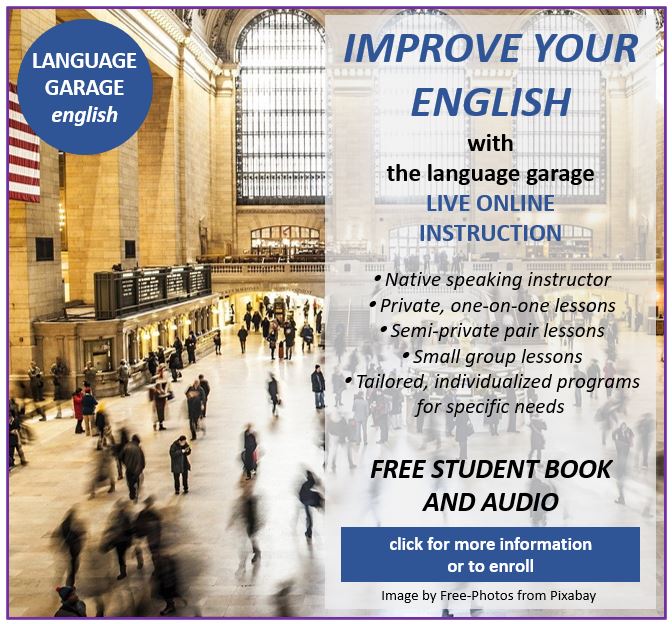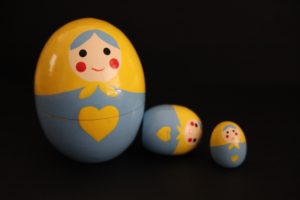Image by congerdesign from Pixabay
In this post we’re going to look at English grammar related to mass and count nouns.
Can I Count It or Not?
English doesn’t have gender or noun class, so all in all, English nouns are less complicated than, for example, French nouns or Swahili nouns. If you’re learning English, you don’t have to worry about which article to use (it’s always the or a/an) or adjective agreement (a tall man, a tall woman, tall men, tall women). Easy, right? Well, there is one aspect of English nouns that might be difficult for you, depending on your native language: count nouns and mass nouns.
English nouns come in two varieties: count nouns and mass nouns. Count nouns are nouns that you can differentiate and count, and mass nouns are nouns that cannot be differentiated and counted.
| COUNT | MASS |
| one house, two houses one child, two children one cup, two cups one dog, two dogs | water air money advice |
Count nouns are separate items that you can tell apart, point to, and count: one potato, two potatoes, three potatoes. Mass nouns cannot be separated into smaller bits – at least not unless you have some sort of container. You can’t tell them apart or count them. Look into a river or a lake and try to count the water. You can’t! You can certainly count units (liters, gallons) of water, or cups, or maybe even individual oxygen and hydrogen atoms. But then you’re counting the liters, gallons, cups, or atoms, not the water.
On top of this difference in meaning, there are some very important differences in grammar that we’ll look at. But first, let’s take a closer look at both types of English noun.
Count Nouns
If you can count it and make it plural, it’s a count noun. Many count nouns are concrete things – books, people, cats, forks. But count nouns can also be collective nouns (teams, families, committees, classes) or in some cases abstract (ideas, thoughts, ideologies, hopes, fears). The thing to keep in mind about count nouns is that there’s a strong distinction between singular and plural.
| SINGULAR COUNT NOUNS | PLURAL COUNT NOUNS |
| one president a person the window one day my friend | two presidents some/a few people the windows how many days? my friends |
Mass Nouns
We’ve already seen that mass nouns cannot be differentiated or counted in separate, individual units. Mass nouns do not have plural forms; they’re always singular. Many different types of nouns can be mass nouns, but the most common fall into a few categories.
| TYPE OF MASS NOUN | EXAMPLES |
| food | bread, butter, flour, cheese, milk, sugar, tea, coffee |
| material | wood, concrete, steel, iron, cotton |
| substance | air, water, oxygen, light |
| concrete things without a definite shape | furniture, jewelry, luggage, money, traffic, grass, snow, rain, clothing, trash |
| abstract ideas | beauty, truth, knowledge, power, peace, time, happiness, |
PRACTICE 1
Are the underlined nouns mass or count?
- We have two cats and a dog.
- I need a lot of sugar for this recipe.
- The trees are beautiful here.
- There’s no grass in our yard.
- I have three fish in an aquarium.
- I had fish for dinner last night.
- This is the first time she’s been here.
- She doesn’t have much time to stay.
Grammatical Differences Between Count and Mass Nouns
Now let’s look at some key grammatical differences between count and mass nouns. We’ll divide them into three categories: plurals, articles, and quantifiers.
Difference 1: Plural
We’ve already seen that count nouns can be made plural, and mass nouns cannot.
| COUNT | MASS |
| one house, two houses one child, two children one cup, two cups one dog, two dogs | water, air, money, advice, |
This doesn’t mean that you can’t count quantities of mass nouns. You can, but only with some sort of container or counter. If your native language is Chinese, Korean, Japanese, or another language with counters (两本书 liǎng běn shū, 책 두 권 chaeg du gwon, 二冊 ni-satsu, two books), you’ll see that English mass nouns are a lot like all nouns in your language. You can count them, but you need to use a noun that refers to a container or individual item of the category. The mass noun itself will remain singular:
| MASS NOUN | EXAMPLES |
| tea | two cups of tea |
| bread | two loaves / pieces of bread |
| water | two liters of water |
| clothing | two articles of clothing |
| trash | two pieces of trash |
But, you may be wondering why you’ve heard examples like “two waters, please!” or “She drinks three coffees a day.” These are perfectly correct in English, and they’re even quite common. You can turn mass nouns for food into count nouns like this, but you’re basically turning them into portions, servings, cups, bottles, etc.
- Two waters, please!
(Two glasses/bottles of water please.) - She drinks three coffees a day.
(She drinks three cups of coffee a day.) - Could you pass me two sugars?
(Could you pass me two packets of sugar?)
You may also have heard examples like the following, where a mass noun is being treated grammatically like a count noun:
- The waters of the Atlantic and Indian Oceans meet near Cape Town.
- The shareholders are discussing how best to allocate the moneys.
- We must always balance our freedoms with our responsibilities.
In these examples, mass nouns are being used as count nouns to force an interpretation where there are separate, differentiated units. Waters means that the water in the Atlantic Ocean is distinct from the water in the Indian Ocean. Moneys are formal units or amounts of money. Freedoms are the different, individual ways that a person enjoys freedom.
You’ll come across examples like this a lot. They show that the use of a plural form forces a count noun interpretation of what would otherwise be a mass noun. There’s no way to interpret “two waters, please!” without some sort of countable container, while “water” on its own must be interpreted as an undifferentiated mass.
PRACTICE 2
Choose singular or plural.
- You need to drink more (water/waters).
- (Sugar/Sugars) can cause tooth decay.
- I don’t have enough (suit/suits).
- You need to have more (patience/patiences) with the kids.
- Could I ask your (advice/advices)?
- There are always (plane/planes) flying in and out of this airport.
- Where can I get a (taxi/taxis)?
- I need some (information/informations) about this.
- Could we get two (beer/beers) please?
- You’re driving, so don’t drink too much (beer/beers).
Difference 2: Articles
The second major grammatical difference, and one that gives a lot of English learners difficulty, is related to the use of articles. Let’s take the articles one by one, starting with the easy areas where there is no difference.
The definite article the refers to a specific or a previously identified noun. You can use the with both count and mass nouns, and in the case of count nouns, with both singulars and plurals.
- The house at the end of the street is mine.
singular count noun: a specific house - The houses in this town are old.
plural count noun: specific houses - The bread from that bakery is excellent.
mass noun: specific bread from a particular bakery
The indefinite article a/an refers to a non-specific, or newly introduced noun. You can use a/an with singular count nouns, but you cannot use a/an with mass nouns.
- There’s a dog in our front yard.
singular, non-specific/newly introduced dog There’s a bread on the table.
impossible without counter: There’s a loaf of bread on the table.- I have a new car.
singular, non-specific, newly introduced car I have a new jewelry.
impossible without counter: I have a new piece of jewelry.
A bare noun is a naked noun, a noun used on its own without an article. Singular count nouns can never be bare in English. You cannot say “I saw dog,” and instead you must always dress the singular count noun dog up with an article or other determiner:
I saw cute dog.
impossible: no naked singular count nouns!- I saw a/the/his/that cute dog.
always use an article or other determiner with singular count nouns. - Horse needs a lot of land.
impossible: no naked singular count nouns! - A/This/The/Our horse needs a lot of land.
always use an article or other determiner with singular count nouns.
Mass nouns are just the opposite. They like to be naked! You can never use a/an with a mass noun, but remember that the is fine. So are other determiners like some, this, and so on.
I try not to eat a sugar.
impossible: don’t use a/an with singular mass nouns.- I try not to eat sugar.
bare mass nouns are perfectly fine I need an advice.
impossible: don’t use a/an with singular mass nouns.- I need advice.
bare mass nouns are perfectly fine. - I need a piece of advice.
use a counter to emphasize the sense of “one unit of…” - I need some advice/the advice/this advice/her advice.
determiners other than a/an are fine with mass nouns
Count nouns can be bare in the plural. (And of course this is irrelevant for mass nouns, which have no plural.)
- Dogs make great pets.
- Horses need a lot of land.
- Cars are becoming more fuel-efficient.
This table summarizes the use of articles and bare noun phrases with count and mass nouns:
| Definite (the) | Indefinite (a/an) | Bare (–) | |
| Count | singular: OK (the dog) plural: OK (the dogs) | OK/Obligatory: (a dog) | singular: NO! ( plural: OK (dogs) |
| Mass | OK (the water) | NO! ( | OK: water |
PRACTICE 3
Choose the correct option.
- I’ve always wanted (dog/a dog).
- (Cotton/A cotton/The cotton) is a very comfortable material.
- Is that necklace (gold/a gold/the gold)?
- Bill has a lot of (experience/an experience) working here.
- Sandra gave me (information/an information) about a job at her company.
- Could I please have (glass/a glass) of water?
- The window is made of (glass/a glass).
- (Horse/Horses) are not native to the Americas.
- How many (televisions/television/a television) do you have?
- I’m tired. I just want to watch (televisions/television/a television) tonight.
Difference 3: Quantifiers
The last area where count and mass nouns show grammatical differences is with quantifiers. Quantifiers are words that indicate a number or amount of something. Numbers are quantifiers, and so are words like some, no, many, much, a lot of, and so on.
Some quantifiers can be used with both count and mass nouns, for example some, any, no, more, and a lot of.
- Do you have any sisters? (count)
Do you have any time? (mass) - I have some books about that. (count)
I have some experience with that. (mass) - We have no pets. (count)
We have no patience. (mass) - They have more libraries than any other town.
They have more traffic than any other town. - She has a lot of friends. (count)
She has a lot of work. (mass)
The quantifiers many, (a) few, fewer, and a number of all refer to numbers, so they can only be used with count nouns.
- How many brothers do you have?
- Do you have many friends?
- I have a few things to do today.
- We have fewer items to pay for than they do.
- There are a number of differences between mass and count nouns.
The quantifiers much, (a) little, less, and an amount of refer to amounts, so they can only be used with mass nouns.
- How much sugar do we need for this recipe?
- Do you have much money?
- I have a little time this morning.
- John has less patience than his sister.
- We still have a great amount of work ahead of us.
PRACTICE 4
Choose the correct option.
- How (much/many) sisters do you have?
- He doesn’t have (much/many) friends.
- He doesn’t have (much/many) time left.
- You can pay here if you have ten items or (fewer/less).
- We have (fewer/less) than an hour to get there.
- I was surprised by the (amount/number) of mistakes in the paper.
- I was surprised by the (amount/number) of time it took to finish the project.
- Mary has a (few/little) suggestions that she’d like to share with the team.
Two-Way Nouns
Many common English nouns have both a count meaning and a mass meaning, and of course you use different grammar depending on the meaning. Here are just a few examples.
- time
count: occasion when something happens: How many times have you been to Paris?
mass: amount of minutes, hours, etc.: Do you have time this morning to talk? - room
count: an individual unit of a house, hotel, etc. This apartment has five rooms.
mass: space. Do you have room for one more person in your car? - space
count: an individual place, or a blank text: I found a space to park my car.
mass: room, amount of area for something: We don’t have enough space for a piano! - light
count: the device that makes it possible to see in the dark: Can you shine a light over here?
mass: photons: The sun creates heat and light. - hair
count: an individual follicle: Yuck! There’s a hair in my soup!
mass: what people usually have on their heads: He’s bald, he doesn’t have hair. - paper:
count: an article, especially academic: She wrote a very influential paper on the topic.
mass: the material you write on: Do you have paper? - glass
count: the dish that you drink from: Could I have a glass of water, please?
mass: the material windows are made of: Be careful! You’ll break the glass in the window. - experience
count: something that you live through: This has been a wonderful experience!
mass: accumulated knowledge, practice, or wisdom: Do you have experience as a manager? - vision
count: the sight of something supernatural: She claims to have visions of the future.
mass: the sense of sight: I wear glasses because my vision is bad.
The Meatgrinder Effect
You saw earlier that when you use count grammar with mass nouns, it has the effect of forcing an interpretation of the mass noun as a separate, countable unit.
- Could we have two teas, please?
(=two cups of tea) - Not all truths are true.
(=not all individual claims of truth) - We set some moneys aside for college.
(=some amounts or sums of money)
You can do the same thing in the other direction, although the meaning is not very pleasant! This is a “meatgrinder” effect, where something that is normally thought of as an individual count noun becomes “meat,” that is, undifferentiated stuff.
- There’s a squirrel on the street.
(count noun, an individual furry little animal who lives in trees) - There’s squirrel in this soup.
(mass noun, the animal squirrel now treated as food, as meat.) - There’s squirrel on the street.
(mass noun, a dead, most likely crushed squirrel that’s been run over by a car and is now “meat”.)
English uses different words for common animals that are alive and thought of as individual living beings, and those same animals when they’re dead and meant to be eaten. A cow is an animal, beef is the meat. A pig is an animal, pork is the meat. In many cases, though, the same word is used, but it’s a count noun when you’re talking about a living animal, but a mass noun when you’re talking abou food.
- I have three fish in an aquarium.
(count, the living, swimming animals) - I had fish for dinner.
(mass, the food) - There are a lot of deer in the woods around here.
(count, animals) - Have you ever had deer?
(mass, meat)
ANSWER KEY
PRACTICE 1: 1. count/count; 2. mass; 3. count; 4. mass; 5. count; 6. mass; 7. count; 8. mass
PRACTICE 2: 1. You need to drink more water. 2. Sugar can cause tooth decay. 3. I don’t have enough suits. 4. You need to have more patience with the kids. 5. Could I ask your advice? 6. There are always planes flying in and out of this airport. 7. Where can I get a taxi? 8. I need some information about this. 9. Could we get two beers please? 10. You’re driving, so don’t drink too much beer.
PRACTICE 3: 1. I’ve always wanted a dog. 2. Cotton is a very comfortable material. 3. Is that necklace gold? 4. Bill has a lot of experience working here. 5. Sandra gave me information about a job at her company. 6. Could I please have a glass of water? 7. The window is made of glass. 8. Horses are not native to the Americas. 9. How many televisions do you have? 10. I’m tired. I just want to watch television tonight.
PRACTICE 4: 1. How many sisters do you have? 2. He doesn’t have many friends. 3. He doesn’t have much time left. 4. You can pay here if you have ten items or fewer. 5. We have less than an hour to get there. 6. I was surprised by the number of mistakes in the paper. 7. I was surprised by the amount of time it took to finish the project. 8. Mary has a few suggestions that she’d like to share with the team.
Learn English with the Language Garage!
If you’re interested in ESL/EFL lessons, please check out our English courses. We have private lessons, lessons for you and a friend or colleague, or small groups. Or see our other posts on English grammar, vocabulary, and more.





